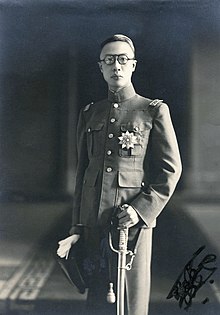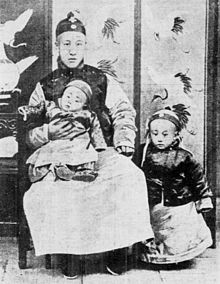Puyi
![]()
The title of this article is ambiguous. For other meanings, see Puyi (disambiguation).
Aisin Gioro Puyi [pʰu iː] (Chinese 愛新覺羅-溥儀 / 爱新觉罗-溥仪, Pinyin Aìxīnjuéluó Pǔyí, Manchurian ᠠᡳᠰᡳᠨ
ᡤᡳᠣᡵ
ᡦᡠ ᡳ; b. 7 February 1906 near Beijing; † 17 October 1967 in Beijing) was descended from the Manchurian clan of Aisin Gioro and was the twelfth and last emperor of the Qing dynasty in China from 1908 to 1912 (as well as during a twelve-day restoration period in 1917).
Puyi later collaborated with Japan, which made him emperor of the puppet state of Manchukuo (1932/1934 to 1945). After imprisonment and years of communist re-education in prisons and camps, he was pardoned in 1959 and finally rehabilitated in 1964. He died in 1967 as an ordinary citizen of the People's Republic of China.

Pu Yi, Last Emperor of China (c. 1930-40)
Origin
Puyi was born on February 7, 1906, the eldest son of Prince Chun II. (Zaifeng) (1883-1951) and his wife Youlan (1884-1921) in the "Northern Ruling Seat", a palace near Beijing. His father was a younger half-brother of the then reigning Emperor Guangxu and descended from the Manchurian princely family of the Aisin Gioro, who had provided the Chinese emperors since 1644 in the Qing Dynasty.

Prince Chun with his two sons, Emperor Puyi (standing) and Pujie, c. 1909
Emperor of China (1908-1912)
At the end of 1908, the childless Emperor Guangxu was dying. Therefore, Empress Dowager Cixi, the real ruler of China and at court, had the only two-year-old Puyi brought to the Forbidden City in Beijing on November 13 to install him as heir to the throne. Cixi had been pulling the strings for 47 years. She was first a concubine of Emperor Xianfeng and had a son with him, Tongzhi, who succeeded his father to the throne as a minor in 1861. After his sudden death in 1875 at the age of 18 - his pregnant wife died two months after him - the empress dowager imposed her three-year-old nephew Zaitian as Emperor Guangxu. The latter was Puyi's uncle.
On November 14, 1908, the day after the boy's arrival in the Forbidden City, Guangxu died, and a day later Cixi. There are rumors that as her death approached, the empress dowager had the inconvenient Guangxu poisoned in order to install a minor successor, Puyi, who would not stand in the way of her political goals. In fact, a lethal dose of arsenic was discovered in Guangxu's body during investigations in 2008.
At only two years old, Puyi was Emperor of China and was enthroned in a highly official, elaborate ceremony in the "Hall of Supreme Harmony" on December 2. The governing motto became Xuāntǒng (宣統 / 宣统). Henceforth, the child-emperor lived apart from his natural parents as a god-like person in the Forbidden City, surrounded by eunuchs, servants, concubines, and concubines of his predecessors. Anyone facing the emperor was required to kowtow to him, and criticism or punishment of him was forbidden. A strict protocol regulated the daily routine of the boy, who reacted rather disturbed to the ceremonies and rituals.
Regency for his minor son was assumed by Prince Chun and Guangxu's widow Longyu. Chun quickly proved unable to consolidate central imperial power. Thus, the dismissal of the powerful commander-in-chief of the imperial army, General Yuan Shikai, proved to be a major mistake. China was in a state of chaos. Corruption and mismanagement threatened to make it ungovernable. Large parts of the country turned away from Beijing, and imperial decrees and edicts had little effect (especially in Canton). Regional warlords determined events, the republican Kuomintang movement had enormous popularity, and foreign great powers strove to expand their influence in China. When the Xinhai Revolution broke out in the autumn of 1911, the end of the monarchy was in sight. On January 1, 1912, Sun Yat-sen proclaimed the Republic of China and the six-year-old Puyi was forced to abdicate on February 12. In the Edict on the "Benevolent Treatment of the Emperor of the Great Qing Dynasty", Puyi was still granted imperial titles and dignities. He was granted unlimited right of residence in the Forbidden City and received an annual appanage of four million yuan for the maintenance of his huge court.
Search within the encyclopedia